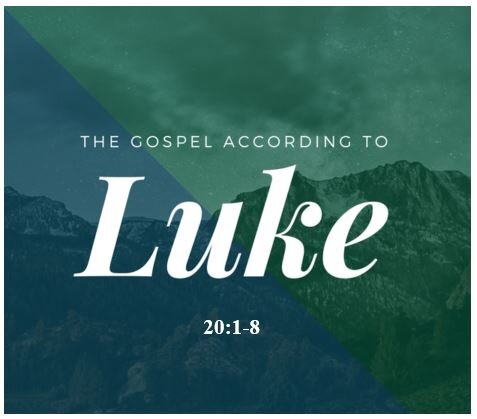BIG IDEA:
THE SOURCE OF THE BAPTISM OF JOHN ANSWERS THE QUESTION OF THE AUTHORITY OF JESUS CHRIST
INTRODUCTION:
Answering the question of authority impacts the choice of whether or not to believe. That is why the authority of Scripture is such a major issue. If it truly is God’s authoritative revelation to mankind then its message of how men must be reconciled to God only through faith in Jesus Christ must be embraced. Here the question brought by the hostile religious leaders deals with the source of the authority of the ministry of Jesus Christ. How did He have the audacity to enter into their temple system of worship and purge the temple of the corrupt moneychangers? Who gave Him the authority to teach and preach without relying on quotations from the famous rabbis? How could He charge the religious leaders of Judaism with hypocrisy and legalism? Their hostility was at a fever pitch. The only thing preventing them from immediately seizing Jesus was His popularity among the pilgrims there in Jerusalem.
I. (:1-2) THE QUESTION OF UNBELIEVING, HOSTILE HEARTS –
WHAT AUTHORITY DOES JESUS HAVE?
A. (:1) Hostile Confrontation
“And it came about on one of the days while He was teaching the people in the temple and preaching the gospel, that the chief priests and the scribes with the elders confronted Him,”
– Jesus involved in legitimate, high priority ministry of teaching and preaching the gospel
– Chief religious leaders on a mission of hostile confrontation
Morris: looks like an official inquiry from the Sanhedrin . . . they were especially concerned with the cleansing of the temple
Lenski: It was rather late to ask about the authority on which Jesus acted, for this was the third day of his last week. Nor do the Sanhedrists come prepared to arrest Jesus, should his authority be deficient. When Jesus refused even to name his authority, they did not even forbid him to teach further, they withdrew in defeat. This shows how the presence of the pilgrim hosts affected the murderous intention of the Sanhedrin.
B. (:2) Condemning Question = Who Gave You Authority?
“and they spoke, saying to Him, ‘Tell us by what authority You are doing these things, or who is the one who gave You this authority?’”
Not asking the question in an open, objective sense seeking to gain information;
This is more like a presidential news conference where the question has been framed to try to expose a lack of credentials and a lack of competency.
Donald Miller: At least two motives lay behind the question. First, if Jesus were to be taken, it was necessary to discredit him before the people. If he could be exposed as having acted without proper credentials, this end might be achieved. Second, if Jesus could be induced to make a verbal claim to Messiahship, they might condemn him for blasphemy.
II. (:3-6) THE METHOD OF INDICTING THE CRITICS BY THEIR OWN WORDS
A. (:3-4) Answering the Question With a Very Obvious Question
“And He answered and said to them, ‘I shall also ask you a question, and you tell Me: “Was the baptism of John from heaven or from men?’”
Not always wise to just directly answer a question – especially from an antagonistic critic. Often it is better to return another question that forces them to see the inconsistencies and the hypocrisy of their mindset.
Donald Miller: John’s baptism was a call to repentance. It involved not theological, but moral, decision. Was God at work in John? Since the mission of John and that of Jesus were bound together (see 7:33-35), a moral decision about John was necessary before the issue of Jesus could be settled.
B. (:5-6) Catching Them In a Dilemma
1. (:5) Accepting John the Baptist Would Place Them in a Bind
“And they reasoned among themselves, saying,
‘If we say, ‘From heaven,’ He will say, ‘Why did you not believe him?’”
Could not just be honest and come up with the simple answer that the observing crowd knows to be true. They had to hold a quick scheming session to see how they could wriggle out of this dilemma.
2. (:6) Attacking John the Baptist Would Place Them in the Grave
“But if we say, ‘From men,’ all the people will stone us to death,
for they are convinced that John was a prophet.’”
C. (:7) Indicting Them By Triggering an Obvious Lie
“And they answered that they did not know where it came from.”
Pretty lame – and the watching crowd could tell that they were exposed as liars and frauds.
Anyabwile: They don’t know because they don’t want to know. They don’t want to say John’s baptism was from heaven because they rejected John. They don’t want to say it was from man because all the people recognized John as a prophet from God. They were stuck between conviction and cowardice. They’re trying to control the spin.
III. (:8) THE ANSWER IS SELF-EVIDENT = A MATTER OF FAITH
“And Jesus said to them, ‘Neither will I tell you by what authority I do these things.’”
Classic Mike drop! Nothing more needs to be said on this issue.
Anyabwile: Beloved, this is a stunning scene. With one question the Lord Jesus Christ exposed the spiritual emptiness of Israel’s religious authorities. If you don’t know where authority comes from, then you can’t truly have it yourself.
By that one question the Lord demonstrated that all of Israel’s religious authorities were unqualified to question his authority. If they couldn’t tell the difference between a prophet and a mere man, how could they judge the Son of God when he came?
When we meet Jesus, we meet a person with unquestionable authority. Mere men cannot challenge the Lord’s right and ability to teach and to rule.

